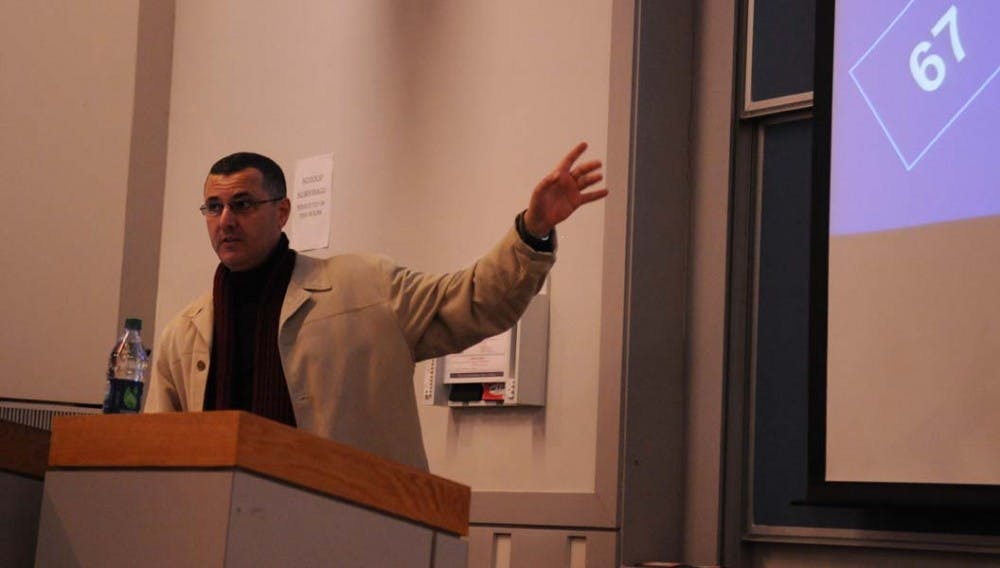
It’s rare when a presentation for adults opens with a warning to listen respectfully to the speaker and refrain from personal attacks.
However, Omar Barghouti — a pro-Palestinian researcher, human rights activist and author who spoke at Claudia Cohen Hall Tuesday — isn’t always met with strong agreement.
His lecture, hosted by Penn for Palestine and PennBDS, in partnership with Philly BDS and Philadelphia Jewish Voice for Peace, was titled “Israel is No South Africa.” It focused on his endorsement of the Boycott, Divestment and Sanctions movement and of the term “apartheid” to describe the Israeli government’s policies.
The primary goal, though, for both Barghouti and the event’s sponsors was to address certain issues of great importance to the Palestinian people.
Co-president of Penn for Palestine and College sophomore Clarissa O’Conor explained that the roles of both Penn for Palestine and PennBDS were to “raise awareness, hold events and host speakers related to Palestine.”
Susan Landau, a founding member of Philly BDS, elaborated that her organization had “stood on street corners after [the Gaza attacks], trying to get Philly to do a boycott campaign, get the message straight.”
She added that “Penn did a remarkable job putting BDS on the map.”
During his lecture, Barghouti argued that Israel was in violation of the UN’s prohibition against apartheid.
Despite this, commercial companies and foreign governments continue to support Israel, through their interactions with both the Israeli government and related organizations like the Jewish National Fund.
As part of this “apartheid system,” Barghouti said, Israel commits human rights violations against the Palestinians. Throughout the talk, he detailed these violations with a series of alarming images — including bombings of Palestinian schools and the Israeli government cutting off water to Palestinian settlements.
The most effective and practical approach to supporting the Palestinians, Barghouti argued, is BDS. He focused most heavily on the economic and cultural aspects of the plan.
The economic boycott, he explained, aims to “make corporate complicity costly” by having people refuse to buy from companies that support Israel and its actions against the Palestinians. The cultural boycott applies not just to average consumers, but also to celebrities. At the urging of pro-Palestinian groups, he said, big names like Stevie Wonder and Vanessa Paradis have refused to perform in Israel or in support of its army.
Suspicion of the American media and its coverage of the Israeli-Palestinian conflict ran deep within both the speaker and his audience.
Marilyn Loos, a member of Christian-Jewish Allies and not affiliated with Penn, said that she was in support of non-violent protest efforts by Palestinians, but that “the press never tells us about [them].”
Barghouti himself expressed even stronger condemnation, referring to the “so-called media” and stating that the claim that Israeli universities are sometimes working for Palestinian rights is an “absolute myth propagated by Zionists who are lying.”
In the end, while Barghouti’s presentation was a call to action for consumers to support Palestinians, his refrain was applicable regardless of one’s political stance or cause: “Silence is complicity.”
The Daily Pennsylvanian is an independent, student-run newspaper. Please consider making a donation to support the coverage that shapes the University. Your generosity ensures a future of strong journalism at Penn.
DonatePlease note All comments are eligible for publication in The Daily Pennsylvanian.





